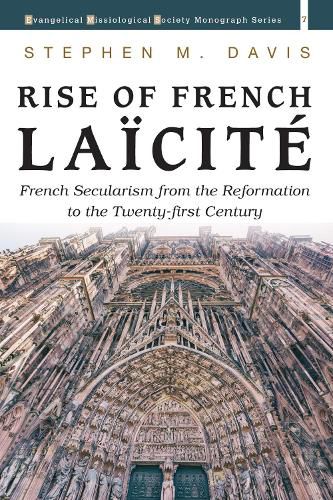Readings Newsletter
Become a Readings Member to make your shopping experience even easier.
Sign in or sign up for free!
You’re not far away from qualifying for FREE standard shipping within Australia
You’ve qualified for FREE standard shipping within Australia
The cart is loading…






This title is printed to order. This book may have been self-published. If so, we cannot guarantee the quality of the content. In the main most books will have gone through the editing process however some may not. We therefore suggest that you be aware of this before ordering this book. If in doubt check either the author or publisher’s details as we are unable to accept any returns unless they are faulty. Please contact us if you have any questions.
Americans are often baffled by France’s general indifference to religion and laws forbidding religious symbols in public schools, full-face veils in public places, and even the interdiction of burkinis on French beaches. An understanding of laicite provides insight in beginning to understand France and its people. Laicite has been described as the complete secularization of institutions as a necessity to prevent a return to the Ancien Regime characterized by the union of church and state. To understand the concept of laicite, one must begin in the sixteenth century with the Protestant Reformation and freedom of conscience recognized by the Edict of Nantes in 1598. This has been called the period of incipient laicite in the toleration of Protestantism. The Revocation of the Edict of Nantes in 1685 reestablished the union of the throne and altar, which resulted in persecution of the Huguenots who fought for the principle of the freedom of conscience. French laicite presents a specificity in origin, definition, and evolution which led to the official separation of church and state in 1905. The question in the early twentieth century concerned the Roman Catholic Church’s compatibility with democracy. That same question is being asked of Islam in the twenty-first century.
$9.00 standard shipping within Australia
FREE standard shipping within Australia for orders over $100.00
Express & International shipping calculated at checkout
This title is printed to order. This book may have been self-published. If so, we cannot guarantee the quality of the content. In the main most books will have gone through the editing process however some may not. We therefore suggest that you be aware of this before ordering this book. If in doubt check either the author or publisher’s details as we are unable to accept any returns unless they are faulty. Please contact us if you have any questions.
Americans are often baffled by France’s general indifference to religion and laws forbidding religious symbols in public schools, full-face veils in public places, and even the interdiction of burkinis on French beaches. An understanding of laicite provides insight in beginning to understand France and its people. Laicite has been described as the complete secularization of institutions as a necessity to prevent a return to the Ancien Regime characterized by the union of church and state. To understand the concept of laicite, one must begin in the sixteenth century with the Protestant Reformation and freedom of conscience recognized by the Edict of Nantes in 1598. This has been called the period of incipient laicite in the toleration of Protestantism. The Revocation of the Edict of Nantes in 1685 reestablished the union of the throne and altar, which resulted in persecution of the Huguenots who fought for the principle of the freedom of conscience. French laicite presents a specificity in origin, definition, and evolution which led to the official separation of church and state in 1905. The question in the early twentieth century concerned the Roman Catholic Church’s compatibility with democracy. That same question is being asked of Islam in the twenty-first century.